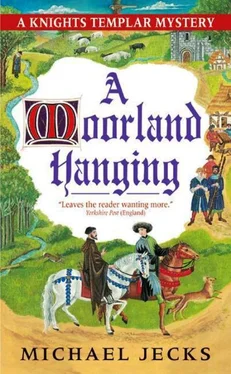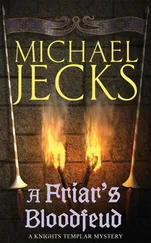“But he did, didn’t he?” His horse was watered, and Simon kicked its flanks to cross the stream. “He did think he was at least equal, to have dared to speak so forwardly. He knew how he was considered by the Manor: as a runaway. And yet he faced them and bested them.”
“Only because of the men with him,” Baldwin protested.
“And why did he feel safe with them?”
“Well, because they were miners like himself, I would imagine. You yourself told me that the miners have their own laws and rules down here. No doubt he knew that with others of his kind he would be safe enough.”
“No, Baldwin. We know that Thomas Smyth is a harsh master, and he’s enforcing his will on the miners round here, that’s why Smalhobbe was beaten, wasn’t it?”
“Well, yes, but perhaps Bruther banded together with other small miners in the area for protection from Smyth?”
“If there was such a group, they failed pretty miserably, didn’t they? If you were going to organize men, and then insulted your enemies, would you leave the others and go home alone in the evenings? I doubt it! After making your mark with an enemy you’d all want to stick together for defense.”
“Yes, I suppose you are right,” said Baldwin musingly.
“So, if Bruther had so many men with him, why was he apparently alone and defenseless on the night he died? Where had the others gone, and why? Why had they left him there?”
“Perhaps they had a disagreement with him? Maybe they wanted to do something which he disapproved of, and…”
“No, no, no – do you remember how Sir Ralph described his meeting with Bruther? It was like the younger man was in charge, wasn’t it? He was the only one who spoke – none of the others did. And it was the same when he insulted Sir Robert. Bruther spoke, the others simply observed and fingered their weapons. No, I think he was in charge, but why was he left all alone? If a leader disagrees with his company, some may leave, but others will stay, even if it’s only a few.”
“Perhaps they did. There might have been others with him when Bruther was killed, but they escaped before they too could be hurt.”
“I don’t think so. Look at it like this: we are working on the assumption that there were three people on the moors nearby that night. If Bruther had even one other man there with him it would have been hard for three to take him on without one of them getting hurt or killed.”
“Well, then. Maybe they did. Maybe they killed the other and threw his body into a bog. And even if they didn’t, if it was one of the knights, they might have been happy to have simply got the man they hated and not cared about the others. You are building bricks without straw, old friend. All of this is guesswork, nothing more.”
Simon shook his head. “I don’t think so. Let’s visit Smalhobbe. Maybe he can shed some light.”
Following the trail, they were retracing the steps of Adam Coyt on the night of the murder, and Baldwin found himself glancing around with interest. The road ran reasonably straight, keeping to the lower ground. Stunted shrubs lined the roads, with occasional clumps of heather. After a short way, a small copse appeared, with hills rising on either side. When he asked, Simon told him that this area was called Believer. The main east-west road was only another mile away, and they should be able to quickly cover the ground beyond to where the outlying miners lived.
The Smalhobbes’ property looked more cheerful now. Smoke drifted idly from the roof, and the gray stone building set in the broad plain appealed to Baldwin. It was the picture of tranquillity, curiously at odds with the recent savage events.
Before the door was Sarah Smalhobbe, seated on a stool and plucking the feathers from a hen while others pecked madly and scratched at the ground. She gave them a slow smile of welcome and called for her husband. After a minute he joined them.
“Bailiff, Sir Baldwin,” he said, ducking his head to them respectfully.
“Henry, we’d like to speak with you for a little,” Simon said, climbing from his horse and passing the reins to Hugh. Smalhobbe looked very tired, he could see, but well enough apart from that. At least he could walk again. The miner was clad in a heavy leather jacket over a thin woollen shirt and short hose. A long knife was at his thick belt. His left arm was wrapped in cloth from the wrist to the elbow, and there was a bruise on one cheek and a cut over a blackened eye.
Smalhobbe sat on his wife’s stool and sighed. “It still hurts to move more than a few yards, sirs. My back is one mass of lumps and bumps where the whoresons laid into me.”
“They won’t be back,” said Simon shortly. “The men have been found, and they are being held at the miners’ camp.”
“What, by more of Thomas Smyth’s miners?” His face registered dismay. “But they were his men! You can’t trust him to keep them guarded, he’ll want them to get out and carry on.” He stared at them both, then at his wife, who stood a short way off, listening with an air of dejected concern.
“They will not, I think,” said Baldwin reassuringly. “They will have other things to occupy them. Thomas Smyth will not come out here again for quite some time, if he ever does.”
The miner did not look convinced. His eyes flitted over the horizon as if expecting to see bands of marauders approaching at any moment.
Simon tried to gain his attention. “Henry, we are finding it difficult to discover who could have killed Bruther. Who do you think might have done it? Do you think it was the same men who attacked you?”
“Harold Magge and the others, you mean?” The miner stared at him. “No, I doubt it. Beating someone up – they could do that… but killing Peter? I don’t think so.”
“You had seen no one else that night, until you were set upon?”
“No, nobody. I was at my works all day and it was quiet.”
“You never went near Wistman’s?”
“No.”
Baldwin interrupted. “You were late home. Why?”
“I was smelting,” he said simply. “It sometimes takes time.”
Simon nodded. “Do you know who Bruther’s friends were?”
“Friends?”
Squatting before him, Baldwin held his gaze. “We know he had several men with him in the days before his death. Sir Robert Beauscyr saw them with him, so did Sir Ralph of Warton – some seven or eight men who looked as if they were miners too. Do you have any idea who they were?”
The miner looked hopelessly at his wife. “No, I don’t know.”
Baldwin saw her quick glance, the pleading expression in her husband’s eyes, and knew the man was lying. “Very well,” he said quietly. “Perhaps you can tell us this, then. What sort of a man was Peter Bruther?”
“He was a miner,” Smalhobbe said off-handedly. “He had not been here for long, and he was learning how to get tin, the same as me.”
“Yes, but what was he like? If we know what sort of man he was, we may be able to guess why someone should want to murder him.”
“He was quick, and self-assured, I suppose. It was hard for him to make friends and trust people, but he seemed happy enough.”
“Was he by nature aggressive?”
“Not that I saw. I mean, he was capable of a fight when he had been drinking, but that’s all.”
“Did he often go drinking?”
“Once or twice a week. He used to go to the Fighting Cock over toward Chagford.”
Simon frowned. “How could he afford that? Paying for ale in an inn should have been impossible for a man like him, a runaway villein now working as a miner. Where did his money come from?”
Shrugging, Smalhobbe did not answer. It was confusing to the knight watching and listening. The miner clearly knew something he was not prepared to talk about. He had been attacked by miners, his neighbor had been murdered… and yet all he could do now was shrug sulkily. Sarah Smalhobbe’s big brown eyes were still glued on her husband. She too was anxious, Baldwin could see, but he had no idea why.
Читать дальше












